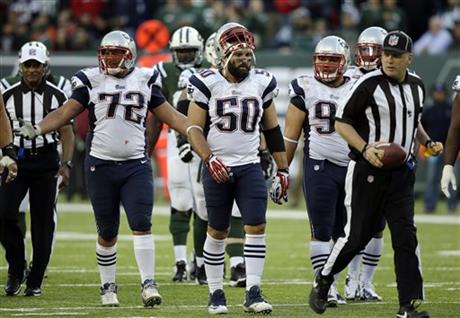The NFL rulebook is thick enough to compete with a New York telephone book — cellphone numbers included.

There are rules, and then there are subsections and points of emphasis to many of those rules. Supreme Court justices might have trouble memorizing the lot of it.
Yet game officials are expected to be well-versed in anything and everything they might have to call.
Fans know all about the major fouls such as pass interference, holding, illegal motion. About some others they are, well, clueless.
As many were for the critical penalty against the Patriots in overtime on Sunday that led to Nick Folk’s winning field goal for the Jets.
We offer a Pick 6 of rules fans should know more about, or would like to have known more about when they were enforced:
PUSHING A TEAMMATE ON PLACEMENT KICKS: This one is at the head of the class right now, especially after Patriots coach Bill Belichick claimed the Jets were doing the same thing earlier in the game that his team got whistled for in OT.
Where did this rule come from? Mainly the players’ union.
When the NFL’s competition committee met with the players in Indianapolis at the combine last February, the union brought it up. Washington’s Will Montgomery was injured when four players were coming down on him, with two behind pushing two in front.
“It’s interesting, because it is a new rule implemented for 2013,” explained Dean Blandino, supervisor of NFL officials. “The genesis was we were looking at field goals and extra points and players in a vulnerable position. There’s interlocked legs, a number of bodies, players pushing others into the formation. So the competition committee felt it needed to be addressed.”
ROUGHING THE HOLDER: The holder, really?
Yep, there are not just penalties for running into the kicker or roughing the kicker on placements, but also for hitting the holder.
And because nearly every team has, for years, used the punter as the holder, isn’t that almost the same as roughing the punter?
THE TUCK RULE: Yeah, this one is gone, and most fans — particularly those of the Oakland Raiders — say good riddance. They would like to have seen the rule disappear in 2001, when it helped Tom Brady and the Patriots in an AFC playoff game.
While it existed until this season, it was among the hardest calls to make, even with replay reviews.
“We have so many continuing action plays, it’s a different scope,” said Bengals coach Marvin Lewis, also a member of the competition committee. “Because of the evolution of replay and putting turnovers into automatic reviews, it just seemed like an easier transition to make right now.”
Now, if a quarterback loses control of the ball before he has fully protected it after opting not to throw, it is a fumble.
CLOCK STOPPAGES: If you thought the clock stopped on every out-of-bounds play and didn’t start again until the ball was snapped, well, think again.
For years, the NFL has restarted the clock after the ball carrier has gone out of bounds, except in the final two minutes of the first half, the final five minutes of the fourth quarter, and in the regular season, the final five minutes of overtime.
In the playoffs, however, Blandino said it is considered a new game when the action goes to overtime. So unless a playoff game or Super Bowl reaches the final two minutes of a sixth period, the OT rules are the same as the first half of any other game.
ONSIDE KICKS: Here’s another one that was scrapped because it made no sense. If an onside kick was illegally touched or it went out of bounds, a re-kick was ordered, with a penalty enforced. But that benefited the kicking team even when it had made a mistake. So now there is no re-kick.
PALPABLY UNFAIR ACT: Sounds like a trade agreement the federal government might pass, but it’s really something a referee has within his power.
“We have a rule where if there was a palpably unfair act, whatever the referee feels is equitable becomes the call,” Blandino said. “If a player comes running off the bench and makes a tackle, the ref can do whatever he feels is equitable in that situation.
“I can’t remember the last time that was called.”
___
AP NFL website: www.pro32.ap.org





